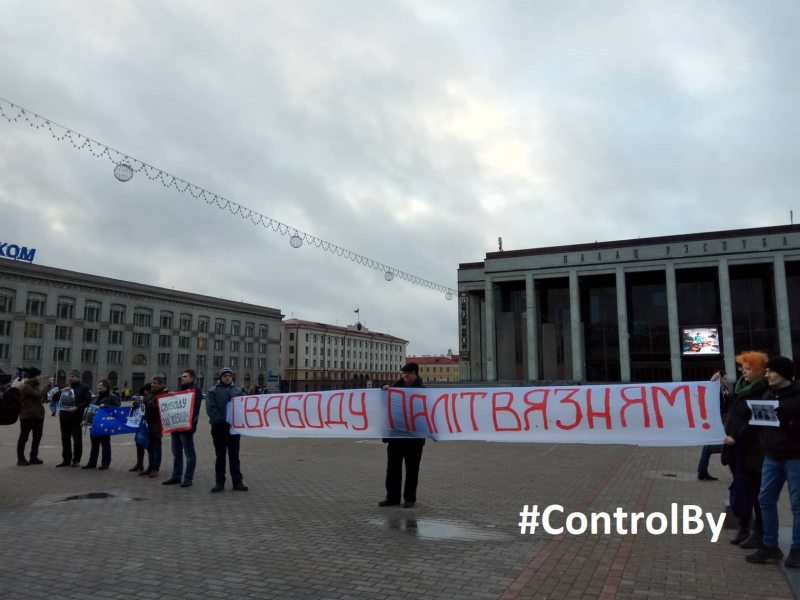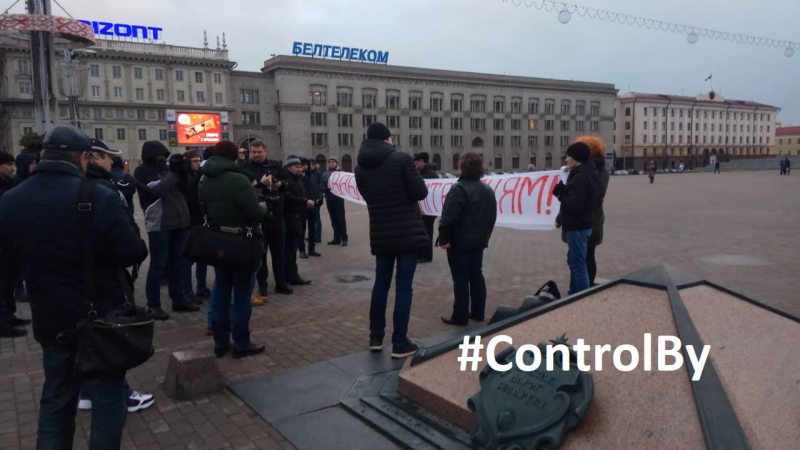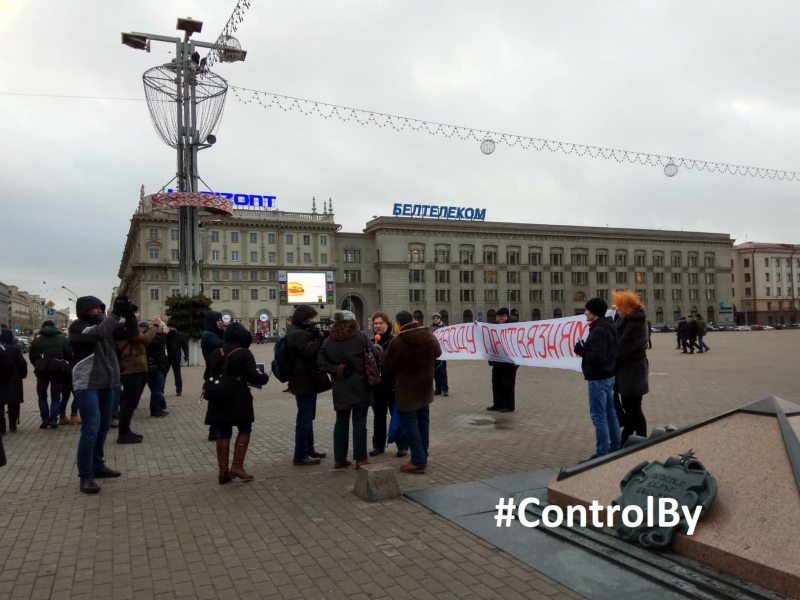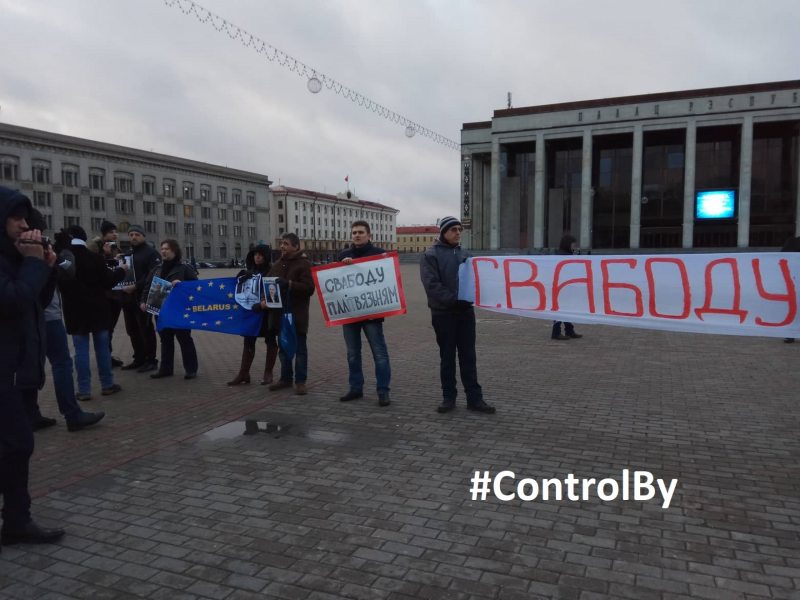Report on monitoring peaceful assembly on February 26 in Minsk
On February 26, 2019, solidarity protest called "Freedom to political prisoners" took place in Minsk.
Summary:
- The assembly was peaceful ("the organizers shall have peaceful intentions and the assembly shall be non-violent" according to the OSCE Guidelining Principles on Freedom of Peaceful Assembly). Participants did not call for violent actions or war and did not use or provoke violence. Participants of the peaceful assembly did not violate public order or traffic rules by their actions, they did not pose a threat to public security and did not violate other people`s rights and freedoms.
- During the peaceful assembly, it was impossible to identify law enforcement officials because they were in plain clothes with no identification mark. The presence of police officers in plain clothes at peaceful assemblies does not allow participants to understand their functions and powers as well as it does not facilitate the communication and effective solution of complex or conflict situations and does not allow law enforcement agencies to provide their activities transparently and in an accountable way.
- There were no obstacles to the work of independent observers and mass media representatives, which seems to be a positive tendency. It is necessary to point out, that, according to the Guidelining Principles, the monitoring of peaceful assemblies is an important source of independent information on the actions from all the parties of an assembly. This information can be used in a variety of ways, including such one as the basis for dialogue between the authorities, law enforcement agencies and civilian people. Monitoring reports help to assess the effectiveness of actual legislation and the state fulfillment of its commitments to protect the freedom of peaceful assembly.
- Observers have no information about whether it is legal permission to organize the peaceful assembly on March 26, in Minsk. However, since the assembly being observed was limited in the number of participants, static and short in time, they did not require detailed coordination with the official authorities and law enforcement agencies. At the same time, prior notification of the authorities about the planned peaceful assembly is a good practice that promotes effective communication of all interested parties.
- During the action, no protocols on the violation of the law were drawn up. There was also no detention of activists.
- There is a piece of information on mass media and Social networks about the arrests of the assembly organizer P. Seviarynets and some activists before the event and some participants after the event. Not far from the place of the assembly [the activist] A. Charniak was detained. A participant of the assembly V. Nikalaichyk was detained in her apartment after the event.
Monitoring methodology
The National Human Rights Public Association "Belarusian Helsinki Committee" and the Human Rights Center "Viasna" systematically monitor every peaceful assembly in Belarus on the basis of developed methodology. It includes recruitment of observers and training them following skills: the principles of public control, international standards of peaceful assembly and monitoring methodology; filling out the monitoring questionnaire during observation; processing of the questionnaires and writing a monitoring report. The questionnaires for the monitoring of peaceful assemblies are developed in cooperation with human rights organizations. They include following points: the functions and powers of observers and journalists, the standards of organizers measures, the participants and law enforcement officials during the assembly as well as the presence of the ambulances and medical rescue teams. Observers are allowed to monitor an event only if they agree with the monitoring rules and principles (such as: to be independent and politically neutral; to contain factual information, not opinions; do not participate into observed event; to adhere to the principles of law: to reject any form of violence and discrimination; to behave correctly). During their terms as observers, people shall stay separately from the participants of the event. They are marked with special certificates and special blue vests with the inscription "#Controlby".
Preliminary information
On February 25, on social networks it was reported about the solidarity protest organized by the forum "Freedom to political prisoners!" and dedicated to those charged with political crimes. Organizers said they had informed some embassies of the western countries about the action. There was no information about the informing of Belarusian authorities.
During the peaceful assembly 4 properly trained and specially marked observers constantly carried out control over the implementation of human rights.
At 17:30 the wife of an organizer Pavel Severinets reported about the detention of her husband as he left his house. There were also detentions of the activists before the action. The day before, on February 25, the activist Dzianis Urbanovich was detained. In the morning, on February 26, activists Anastasiya Huseva and Dzmitry Paliyenka reported that they were summoned to a District Department of Internal Affairs where at the same day they were detained. There is no information about the motives of those arrests, however, the context and the tendency of preventive detentions in Belarus shows it does not contribute to the realization of freedom of peaceful assembly.
During the peaceful assembly, the following facts were noted:
- Near 17:55, the participants of the event started to gather on the Kastryčnickaja square. They were standing with portrays and banners face to Niezaliežnasci avenue. There were at least 11 participants.
- There were also at least 13 law enforcement officers in plain clothes (they could be identified by the radios, earphones, hand cameras and by other specific signs). Some of them filmed the event on hand cameras. At the nearest crossroads, there were 2 traffic police officers in uniform.
- At least 8 people (seemed to be journalists) communicated with participants of the event, filmed the event on a photo- and video-cameras and took the interviews. Participants actively communicated with mass media representatives.
- Participants used such slogans as: "Freedom to Baranovich!", "Freedom to Valavik!", "Freedom to Zhamchuzhny!", "Freedom to Yurkoits!", "Freedom to Boika!", "Freedom to Tsekhanovich!", "Freedom to Fiadynich!", "Freedom!", "Freedom to political prisoners!", "Freedom to Charter 97!", "Long live Belarus!" Participants also used banners with the following phrases: "Freedom to political prisoners!", the flag of the "European Belarus" campaign, the portrait of S. Baranovich, two portraits of Fiadynich with the phrase: "Henadz Fiadynich and the Belarusian Radio and Electronic Industry Workers` Union (REP)", the portrait of I. Komlik with the phrase "Freedom to Ihar Komlik" on it, the portrait of S. Baranovich with the phrase "Freedom to Sviataslau Baranovich" and the portrait of M. Zhamchuzhny with the phrase "Freedom to Mikhail Zhamchuzhny" on it.
- With the end of the event at 18:25 the participants started to leave.
Recommendations:
for organizers:
- to notify city authorities and/or law enforcement agencies about planned peaceful assembly.
for law enforcement officers:
- to wear the uniform while protecting the public order during peaceful assemblies and to have individual identification means (e.g. badges or other signs);
- to appoint a contact person from among the police officers for communication with observers, media, organizers and participants of the peaceful assembly;
- do not take administrative actions against those participating in peaceful assemblies, as this is an arbitrary restriction of the right to peaceful assembly, provided for by the international commitments of the Republic of Belarus in the field of human rights;
- do not take a fee for the control over the law enforcement during the participants’ implementation of the right to peaceful assembly and the right to freedom of speech.
- do not detain organizers and participants before/during or after peaceful assembly arbitrarily and unreasonably limiting their rights to the freedom of peaceful assembly.
for those having the right to initiate legislation:
- to initiate changes on the national legislation and bring it into line with international standards in the field of freedom of peaceful assembly.
for the executive body:
- to promote the implementation of freedom of peaceful assembly in Belarus, not to establish excessive administrative procedures, to refrain from arbitrary restrictions on places of peaceful assemblies and not to demand payment for law enforcement, medical care and cleaning services.
for public utilities and health services:
- not to take a fee for the services during the people`s implementation of the right to freedom of peaceful assembly and the right to freedom of speech.
for judicial authorities:
- not to bring people to administrative responsibility for their participation in peaceful assemblies as this is an arbitrary restriction of the right to peaceful assembly provided for by the international commitments of the Republic of Belarus in the field of human rights.





















